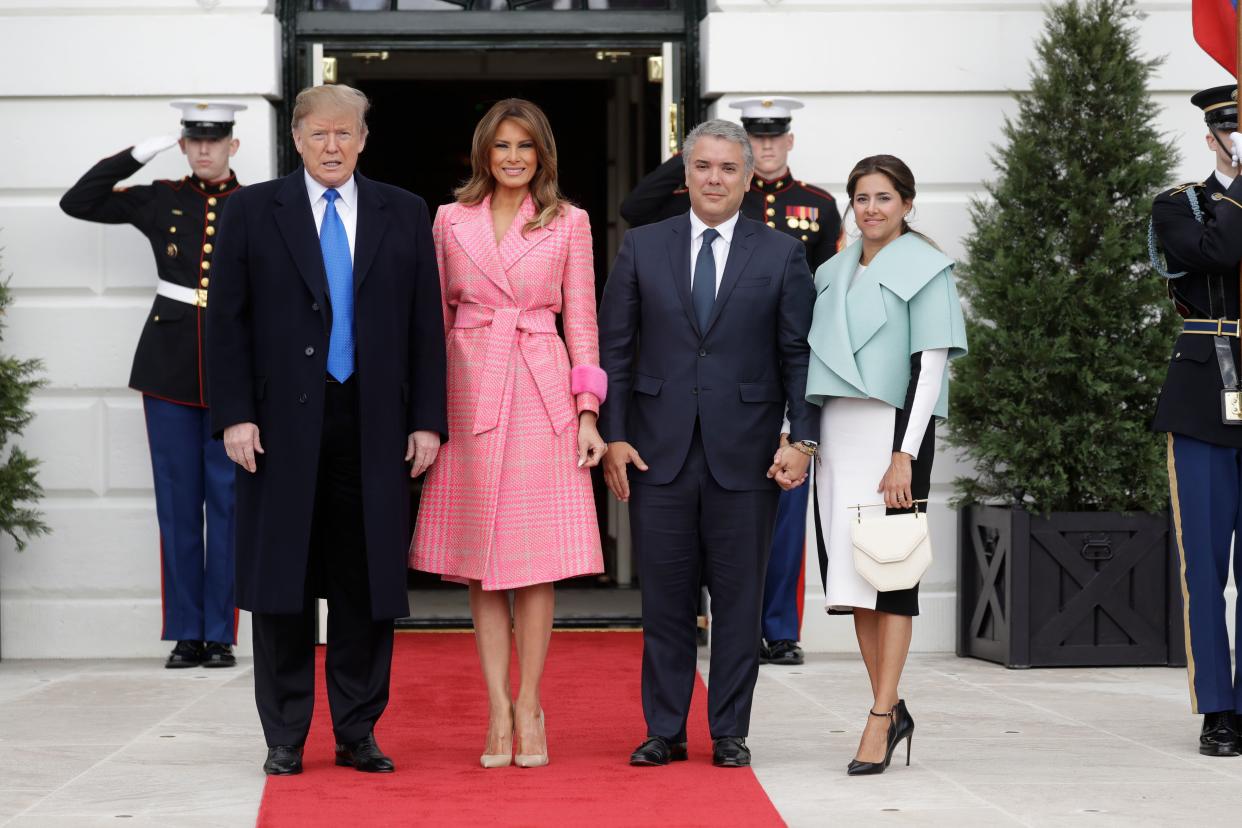Donald Trump denounces 'turmoil' in Venezuela, declines to talk about using U.S. troops

WASHINGTON – President Donald Trump said Wednesday he would discuss the "turmoil" in Venezuela with Colombian counterpart Ivan Duque, but he would not talk publicly about the prospect of sending U.S. troops to the region.
“We look at all options," Trump told reporters when asked about troops, but “I never talk about that."
Before his Oval Office meeting with the Colombian president, Trump also said "people are being treated very badly" in Venezuela. "I don’t like seeing it. I’m not happy about it," the president said.
The U.S. has recognized Juan Guaido, an opposition leader, as Venezuela's interim president and demanded that President Nicolas Maduro stand down. In praising Guaido during Wednesday's meeting, Trump told reporters he had "great respect for the man that most people, many people, think is the real president."
Trump has previously said “all options” are on the table in trying to oust Maduro from power, including a plan to deploy a limited number of U.S. troops to Colombia's border with Venezuela. National security adviser John Bolton caused a stir recently when he appeared in the White House briefing room clutching a notepad that had "5,000 troops to Colombia” written on it.
The White House did not quash questions at the time about whether that meant the administration was preparing to dispatch U.S. troops to Colombia. A White House spokesman simply reiterated Trump's "all options are on the table" declaration.
For his part, Duque said of Maduro: "I think the days for this dictatorship are about to end."
Since declaring Marudo’s rule illegitimate last month, the United States and a raft of other countries have tried to bolster Guaido, the head of Venezuela’s National Assembly, as the new leader.
The Trump administration has also slapped economic sanctions on Venezuela’s oil industry in an effort to cut off revenue to Maduro’s government.
Venezuela is in the midst of an economic and humanitarian crisis, with hyperinflation and food shortages causing widespread hunger and desperation. More than 3 million Venezuelans have fled their homeland.
Colombia has taken in hundreds of thousands of Venezuelan refugees amid the crisis.
The State Department has dispatched humanitarian aid to the border but the Maduro-controlled security forces have blocked it from reaching Venezuelans in need.
Maduro has called the aid a ruse to justify American military intervention and accused the Trump administration of being a “gang of extremists” who want to take over his country.
Trump’s meeting with Colombia's leader came as the House Foreign Affairs Committee held a hearing on Venezuela with testimony from the Trump administration’s newly appointed special envoy for Venezuela Elliott Abrams.
Rep. Bill Keating, a California Democrat and member of the committee, criticized the administration’s public flirtation with a possible military intervention.
“It could backfire on us,” Keating said. “… It plays right into the hands of the dictator that’s our adversary right now.”
Abrams downplayed the possibility and said it had not impacted America’s efforts to deliver humanitarian aid and support Guaido.
“This is not the path the United States is pursuing,” he said, adding “we always take the position that all options are on the table.”
But Abrams seemed to hedge when pressed by Rep. David Cicilline, a Rhode Island Democrat, on whether the administration was planning a military deployment and asked him to pledge that no such action would be taken.
“I know of no such planning,” Abrams answered. Still, Abrams said he could not make a pledge that the administration would not act without consulting Congress, questioning whether the War Powers Act requires such notice.
Steve Olive, the acting assistant administrator for the U.S. Agency for International Development’s Latin American bureau, told the House Foreign Affairs Committee that situation in Venezuela "is deteriorating on a daily basis."
Hospitals can’t do routine surgeries, there are regular power outages and increasing reports of malnutrition among infants, he said.
“Food is available but it’s controlled by the regime and used as a tool,” Olive said.
At the White House, when asked if he has plan a "Plan B" should Maduro stay in power, Trump said: "I always have Plan B and C and D and E and F. I have great flexibility. I probably have more flexibility than any man that's ever been in this office.
"So we'll see. But there are many plans, and we'll see where we go."
In addition to Venezuela, Trump and the Colombian president also planned to discuss counter-terrorism and combating illegal drug trafficking.
This article originally appeared on USA TODAY: Donald Trump denounces 'turmoil' in Venezuela, declines to talk about using U.S. troops

